Free Energy Principle
2022-04-24: Thermodynamics reference:
- Self-Entropic Broadening Theory: Toward a New Understanding of Self and Behavior Change Informed by Psychedelics and Psychosis
- https://www.youtube.com/watch?v=7jY4c2sNWUc there’s a couple cool Carhart-Harris lectures on youtube
- https://www.reddit.com/r/neuro/comments/qjg0yd/theories_of_consciousness_list/
-
23 July 30 “Hypergraph & consciousness” by Alex Maier
- at 1st Qualia Structure Grant MTG, Prof Alexander Maier at Vanderbilt University .
- https://www.functionalnoise.com/ QRI-adjacent blog. Mostly just a guy talking about random tech stuff too though
- https://www.carhartharrislab.com/
- http://www.iawwai.com/FractalBrains.html could be worth a read
- Kinda related-ish: Stephen Lehar’s Harmonic Gestalt. https://www.youtube.com/watch?v=LJiXTCbFtu0 he has been theorizing about harmonic resonance as neurocomputation since the 90s
- Our Superconducing Consciousness
Free Energy Principle/ Carhart-Harris #
Related to Predictive Processing/bayesian inferences.
Put forth by Karl Friston and Robin Carhart-Harris.
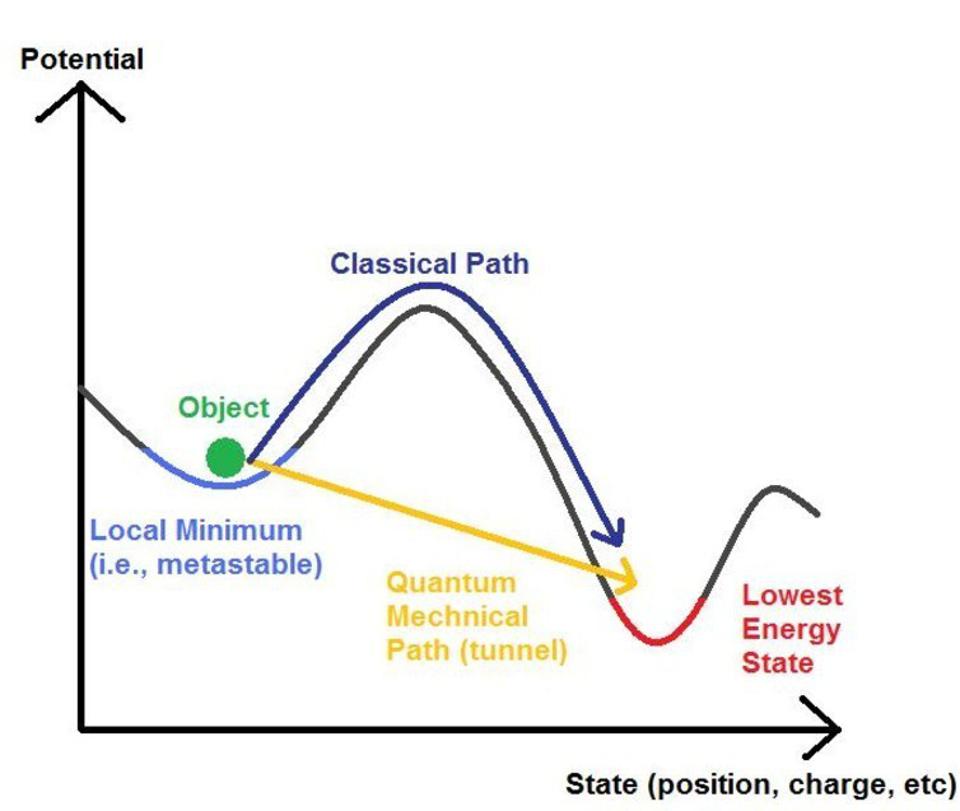
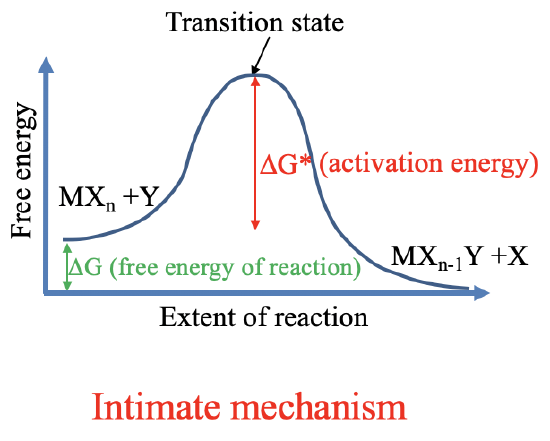
Epic Discord debate #
Jabronie: all the spectral graph theory and this paper is just neuroscientists trying to sound shmancy fancy when their just looking at signal analysis / processing stuff that has been known for like decade(s) + minimum before neuroscientists got their panties in a bundle over them. i argue this is all low hanging fruit and neuroscientists being mathematically lazy, the real potential lies in statistical physics & stochastic analysis, or drawing inspiration from Amari’s work from the 60s-80s / extending his work. literally techniques known for decades in applied math and variational bayes renamed to free energy minimization. the bayesian brain idea is like ~20 years old now too. the active inference discord is beyond cringe & descriptive autoerotic word salad masterbation. Shun’ichi Amari, he developed neural field theory and a lot of pioneering mathematical models starting in the like late 50s/60s. i think friston essentially in the 90s with statistical parametric mapping peaked and then went off on this sophisticated charlatan word salad description of the bayesian brain and variational bayesian inference and now because it’s not yielding anything new and no actual top researchers in the field care about it he’s adding more papers and building a cult to be validated by and just dancing around all the questions and concerns and skepticism of the actual neuroscience community
Neti: people talk about long term potentiation by comparing neural pathways to developing muscles - that the more you use it the strong it gets. I think these sorts of analogies and mental constructs are essential as you get into more and more abstract ideas - especially as it becomes harder to relate it to everyday normal stuff. I think Einstein spoke of using thought experiments like imagining themself riding particles and stuff to come up with their ideas.
J: neuroscience isn’t a mathematical concept at the current moment so this response although valid is unrelated to what I was saying - if you want to actually understand math you often have limitations to how much you can simplify and analogize things, Feynman himself is famous for speaking of this in the fun to imagine youtube video.
Framed: it follows from mathematics you cant falsify it, its a statement
J: That’s not true. The principle is mostly based on a loose interpretation of statistical physics and is not even close to being slightly mathematically rigorous.
F: mathematically rigorous in the sense that it is internally consistent but it is not like any system follows it, it’s just that “it cannot be falsified. It cannot be disproven. In fact, there’s not much you can do with it, unless you ask whether measurable systems conform to the principle”. Maybe i expressed myself wrong but what ur implying is that i said any system that is themodynamic non in equilibrium must follow this princicple because of mathematical proof but i didnt mean to say that, chill lol
J: and that’s the exact point. if you can’t do shit with it who the fuck cares besides the small group of psychedelic swiss cheese smooth brain gangers who hype it up and suck Friston / Carharts dick 247 while ignoring all the actual good viable meaningful results producing research in the field of computational neuroscience/neuroinformatics. i don’t think friston properly understands non equilibrium statistical physics. it’s literally variational bayesian inference i love how in his new book he introduces fokker planck and then like says “but this is too advanced for this book”. i am certain i’ve done more work in computational neuroscience then you have. nobody in the actual field gives a shit about free energy principle
F: but still dont have a full stack consciousness theory. but ok
J: that’s because people who try to explain consciousness are philosophers at this point or at best cognitive scientist. they are not real neuroscientist doing real experiments or developing real theories that provide anything new or useful. go read amari’s work from the 60s instead of getting sold by a fraud named friston. ur welcome and should appreciate. it’s unprincipled to allow people to continue spreading nonsense as a means to get validated or sound smart.
F: yeah it sucks spew bullshit just to try to sound smart
J: i mean this is just how people cope who are too lazy or unmotivated to actually dig deep into fields themselves / learn any actual computational/mathematical neuroscience. it’s low hanging fruit with 0 barrier to entry besides being able to weave words around and sound smart to unsuspecting laymen who don’t know better. do you think dopamine is important? then why do you think comp neuroscientist isn’t? the breakthroughs in the late 90s and 2000s with dopamine were entirely facilitated because of neuroinformatics/comp neuroscientist. http://www.scholarpedia.org/article/Reward_signals#Reward_prediction_error temporal discounting + actual experiments with recordings for reward prediction error encodings.
F: because if i tell you that the brain doesnt solve problems with constraint satisfaction, u are like: what no fucking way.
J: bro ur probably a smart kid just haven’t realized ur potential nor found the motivation and requisite patience and focus to actually study these things properly and get a sense of what the field even is. stop getting lost in charlatanism by friston & carhartt and go watch the new mit ocw series on comp neuro or something.
F: Tell me, do you think the brain solves problems with constraint satisfaction?
J: Biopysics: Searching for Principles. read this guys work. he’s an actual pioneer, and has actually changed neuroscientist and biology forever. unlike friston. whose original work SPM is even considered by some flimsy. reality is showing FEP doesn’t yield anything of use to anyone that we didn’t already know decades ago. FEP = bayesian brain + shoddy statistical physics/thermodynamics + variational bayes inference. literally not a single original idea. now friston is trying to copy from amaris original work. and btw. i am not trying to be a dick. but if you like friston you might as well read the works of the guy who he keeps taking his ideas from: Stochastic Reasoning, Free Energy, and Information Geometry. shun-ichi amari actually understands mathematics and physics and has done excellent work for >60 years which has been monumental to the field. he also invented information geometry.
J: dopamine has as much to do with suffering as pleasure. same for learning: Reversal Learning and Dopamine: A Bayesian Perspective
F: physisical dissonance feels phenomenologically bad. while physical simmetry and coherence makes you feel good. that would make lot of sense! oscillatory synchrony is energetically cheap. the brain would want that!
J: do you even know what coherence is in neuroscience? read this and learn about the phase precession effect maybe Theta-phase dependent neuronal coding during sequence learning in human single neurons (a paper on LFPs and whatnot). non linear wave models are another thing entirely as well. scholarpedia is a very good resource: http://www.scholarpedia.org/article/Linear_and_nonlinear_waves
F: Human brain networks function in connectome-specific harmonic waves
J: i read that the other day. it wasn’t anything new. it’s also old research. i have a friend who is the chair at u illinois of psychiatry and neuroimaging. he’s actually brought this research alive. Network Diffusion Embedding Reveals Transdiagnostic Subnetwork Disruption and Potential Treatment Targets in Internalizing Psychopathologies: he actually used the graph laplacians to calculate the heat transfer coefficients (or information transfer coefficients) in different mental illness patient population groups compared to controls. he’s now looking at magnetic therapy and other options to try to locally increase the information transfer coefficient in these patients, because the patients with i.e. depression had much much lower heat / info transfer coefficients compared to controls.
F: The brain tries to predict it’s envirioment and to do so it tries to make a model of the world that has a balance between accuracy-complexity (because otherwise you can just have a huge lookup table but that would be computationally intractable) the reason why it does this it’s because complexity is dissonant (maning parts of the system end up being physically dissonant) but also a prediction error is dissonant (because you would have physical dissonance between different layer of the cortex) this balance automatically gives rise to FEP. and the reason i say Computational Neuroscience is bullshit (or i dont like it) it’s because the brain DOES NOT solve problems using constraint satisfaction for god sake that would require a shit ton of computation. What it does is that it uses self-organizing princicples (like annealing) (but especially of waving propagation and interference) to solve the problems FOR you.
J: Annealing isn’t a self organizing principle. It’s a physical phenomena that motivated a optimization algorithm.
F: look rn im tired but if you realize that symmetry feels plesurable for the brain because it is energetically cheap and allows for smooth transition of information everything makes so much sense. and stuff like boredom is an anti-symmetry mechanism that was recruited by natural selection to avoid you feel blissfull all the time and actually persuit things that cause symmetry (oh look pleasure centers allow global scale synchronization).
J: The funny thing is everything about minimizing free energy hints that humans by default do this and this is optimal for the organism. But we know that utilizing the pfc and doing the harder thing when the harder thing is the right thing and more metabolic resource consuming is what makes humans strive and succesful. Minimizing energy would be actually succumbing to all desires and drugs and taking the path that feels easier in life. Feels because it takes less locus of control and free will executing and timing neurons/networks correctly to tune one for success and happiness. Nobody understands how the brain works as a distributed energy source. But it is a distributed energy source that is active media with autowaves. If the principle was universally true we’d all be addicted to the easy life and nobody would become a oligarch or professor etc etc
- F: pfc does the harder thing because it causes symmetry in the long run
- This makes more sense to me. Like duh obviously long-term planning is part of it
J: That says nothing. Define symmetry. Show the experimental evidence.
J: If you read into Gibbs Boltzmann and Shannon’s entropy and the idea of what entropy is in terms of microstates and a weighted probability of the logarithmic probability of said random variables or states (depending if in info theory or thermo/stat physics) you would see that the concept of minimizing surprise has been loosely associated with what Boltzmann and Gibbs and Shannon and renyi and von Neumann meant by entropy
F: ur barking rn
J: The entire free energy principle is based on the concept of information content and entropy so how can you rebuttal with this? It’s the literal definition of entropy and the basis of this entire fep
J: What you (Ravvna) said about pseudo to fringe to accepted. Cajal faced great opposition and oppression when he presented the neuron doctrine. He literally went back to the lab for a few years and did nothing with his life but collect experimental evidence to prove the naysayers wrong. There was an entire campaign and political movement by cajals opponents in the field. Even after he won the Nobel prize in 1907 many old pioneers in the field disputed the neuron doctrine and thought the Nervous system was continuous and not made of discrete cellular neurons. Cajals visual intuition and ability to vocalize it in words is unrivalled 120 years later. Many things he wrote about 120 years ago only were recently found despite him hypothesizing their existence in the late 1800s.
Entropic Brain Theory #
So this must be the guy causing a psychedelic storm in neuroscience research.
-
The entropic brain - Revisited - Robin L. Carhart-Harris (Jan 2018)
- Qualia can be indexed by a quantitative measure of information-theoretic entropy in a given parameter of spontaneous brain activity.
- Entropy in a dynamic system simultaneously indexes information content and uncertainty of its future behavior.
- Thus, the theory claims the two are synonymous.
- The position of the entropic brain is that ‘mind’ is fundamentally ‘information’ but the informational ‘code’ is physically and dynamically instantiated in brain activity and can therefore be decoded.
- In any case, whatever it is they’re measuring with fMRI/EEG, higher entropy was observed in psychedelic and ketamine trials. They also used Lempel-Ziv Complexity to measure
-
Serotonin and brain function: a tale of two receptors (Carhart-Harris & Nutt, 2017)
- Mechanistically, 5-HT2A signalling has been hypothesised to serve a function analogous to ‘annealing’ in metallurgy or system ‘reset’ in computing, where through enhanced excitability, the influence of prior beliefs is relaxed – as per a flattened energy landscape – so that new learning can occur.
-
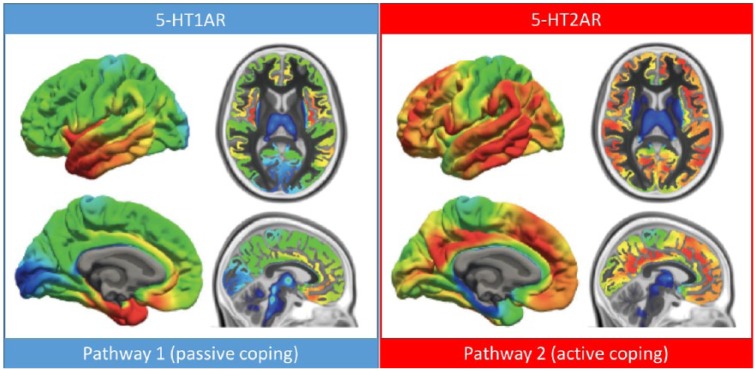
-
Serotonin and stress coping (2014)
- Dorsal Raphe Nucleus CRH
- Stress experience
- 5-HT1A = passive coping = tolerating
- Serotonin has quite a high affinity for it; 5-HT1A is suspected to dominate serotonergic neurotransmission.
- The majority of 5-HT1A is expressed postsynaptically.
- 5-HT2A = active coping = changing relationship to the source of psychological pain.
- The double edged sword of neural plasticity: increasing serotonin levels leads to both greater vulnerability to depression and improved capacity to recover (Branchi 2011)
-
Serotonin and stress coping (2014)
-
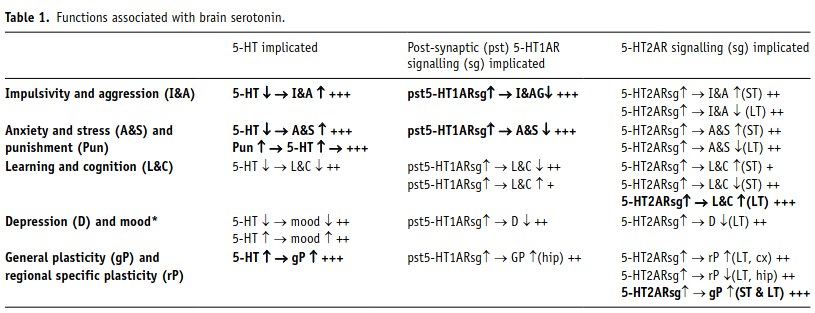
- There are very sizeable subheadings for each entry here.
Qualia #
-
Neural Annealing: Toward a Neural Theory of Everything - Michael Edward Johnson
- Super simply analogy (except not really, since it’s literally annealing) https://www.youtube.com/watch?v=tqRA2m9zlns
- Integrates:
- Friston’s Free Energy Principle,
- Atasoy’s CSHWs,
- Entropic Brain Hypothesis,
- AND the Symmetry Theory of Valence.
- file:///home/Downloads/Qualia_Formalism_and_a_Symmetry_Theory_of_Valence.pdf
-
Principia Qualia (Summary) (Mike Johnson)
- What is orgasm? A model of sexual trance and climax via rhythmic entrainment
- physics and deep learning neural networks display cross-domain parallels such as “symmetry, locality, compositionality and polynomial log-probability”, and that deep learning can often avoid combinatorial explosion due to the fact that the physical world has lots of predictable symmetries, which enable unusually efficient neural network encoding schemes: [Why Does Deep and Cheap Learning Work So Well?]
- Why do we find pure order & symmetry boring, and not particularly beautiful? I posit boredom is a very sophisticated “anti-wireheading” technology which prevents the symmetry/pleasure attractor basin from being too ‘sticky’, and may be activated by an especially low rate of Reward Prediction Errors.
-
A Future for Neuroscience (Mike Johnson)
- This is going to be the backbone of how we understand the brain/mind in the future:
Human brain networks function in connectome-specific harmonic waves (Atasoy et al., 2016)
- YT - Selen Atasoy: Enhanced Improvisation in LSD Brain Processing
- Combines fMRI/MRI and DTI to approximate a brain’s Connectome. Uses it to calculate a brain’s intrinsic ‘eigenvalues’, or the neural frequencies which naturally resonate in a given brain, as well as the way the brain is currently distributing energy (periodic neural activity) between these eigenvalues.
- then with an empirically-derived wave propagation equation calculate what the natural harmonics are of this connectome, then estimate which power distribution between these harmonics would most accurately reconstruct the observed fMRI activity.
- Not gonna even pretend I know what this eigenshit is. It’s like complicated function-inside-vector hilbert space idek stuff. I would assume those shapes in (a) are some kind of constant that is emergent from everything else and I can thus see why this is attractive to qualia people:
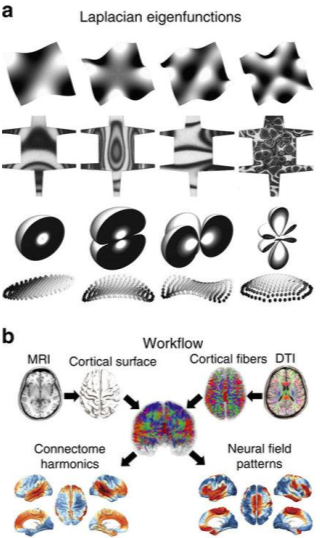
- Not gonna even pretend I know what this eigenshit is. It’s like complicated function-inside-vector hilbert space idek stuff. I would assume those shapes in (a) are some kind of constant that is emergent from everything else and I can thus see why this is attractive to qualia people:
- then with an empirically-derived wave propagation equation calculate what the natural harmonics are of this connectome, then estimate which power distribution between these harmonics would most accurately reconstruct the observed fMRI activity.
- Like a tuning fork, the brain has a natural resonance; the substrate is the connectome and it has an activation/inhibition oscillating wave.
- This is going to be the backbone of how we understand the brain/mind in the future:
Human brain networks function in connectome-specific harmonic waves (Atasoy et al., 2016)
- Don’t forget the boundary problem! How EM field topology can address the overlooked cousin to the binding problem for consciousness